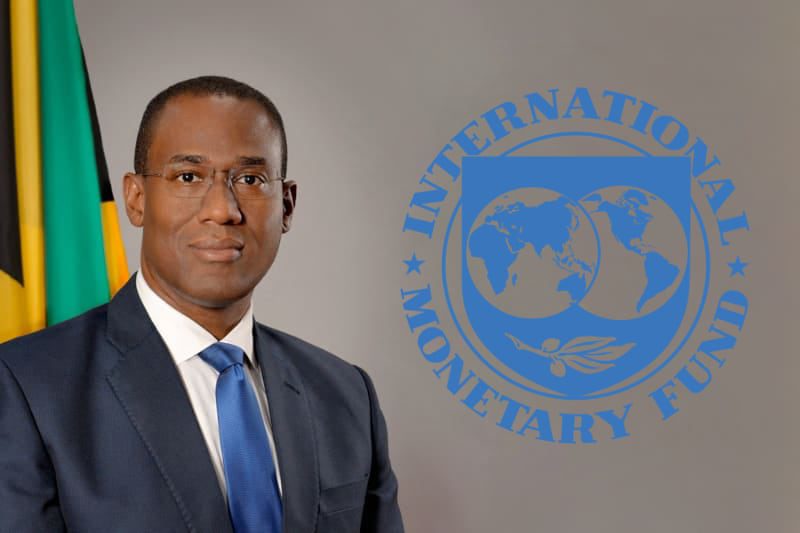Jamaica’s Dr. Nigel Clarke proposed as IMF Deputy Managing Director

Dr. Nigel Clarke, the Minister of Finance of Jamaica and the driver of that country’s multi-layered approach to disaster risk financing that includes the first catastrophe bond for a small-island state has been proposed to become a Deputy Managing Director of the International Monetary Fund (IMF).
Kristalina Georgieva, Managing Director of the IMF, announced her proposal to appoint Nigel Clarke to the position as of October 31st 2024, succeeding Antoinette Sayeh, who steps down on September 12th.
Georgieva explained, “Mr. Clarke is an exceptional public servant and policymaker, with proven leadership in institution building and economic crisis management, who has stewarded his country’s economy to a stronger and more sustainable position.
“Since 2016, he has been the IMF’s chief counterpart on successive and historically successful programs for Jamaica, including an Extended Fund Facility, a precautionary Stand-By Arrangement, and most recently a Precautionary Liquidity Line plus Resilience and Sustainability Facility, leaving the country with robust economic fundamentals. Nigel also brings a wealth of experience from a stellar private sector career.”
Clarke has been Jamaica’s Minister of Finance and the Public Service, and a Member of Parliament, since March 2018.
During his time working in Jamaica’s government, Clarke has overseen the countries implementation of a multi-layered disaster risk financing program.
As part of that, Jamaica became the first small country to independently sponsor a catastrophe bond, with World Bank assistance, the IMF highlighted in its announcement of his proposal to the Deputy MD role..
Jamaica first benefited from catastrophe bond coverage in 2021 when it sponsored the IBRD CAR 130 transaction.
This was renewed earlier this year, with the IBRD CAR Jamaica 2024 catastrophe bond issued in May.
Under Clarke’s watch, Jamaica has put together one of the best examples of a multi-layered approach to disaster risk financing and transfer, with a range of instruments, some of which parametric insurance and cat bonds, designed to respond to disasters of differing frequency and severity.
The disaster risk financing program was recently put to the test when major hurricane Beryl narrowly missed Jamaica, but still caused significant impacts to the country and its population.
While the World Bank catastrophe bond did not get triggered by the storm, a number of other instruments including parametric insurance from the CCRIF did, which ensured Jamaica had liquidity and funds available quickly for rebuilding and recovery.
Clarke went to great lengths to explain why the layered approach to disaster risk finance benefits Jamaica and that not every risk transfer instrument had been designed to respond to every storm.
As we reported recently, a line has to be drawn between affordability and coverage when it comes to parametric instruments, such as Jamaica’s cat bond and other risk transfer. This is something Clarke navigated with his team in developing the layered approach to disaster risk financing that benefits Jamaica.
Clarke was elected Chairman of the Board of Governors of the Inter-American Development Bank and the Inter-American Investment Corporation in 2022. Before entering public service, he was Vice Chairman and Chief Financial Officer of the Musson Group, a regional conglomerate, and began his career as an Equity Derivatives Trader at Goldman Sachs in London. Clarke holds a PhD in Numerical Analysis from Oxford University where he was a Rhodes Scholar, and a Master of Science Degree in Applied Statistics, also from Oxford, while he was a Commonwealth Scholar.
The IMF has itself long-called for greater use of catastrophe bonds and other responsive disaster risk financing instruments.
The IMF began to develop a focus on catastrophe bonds as long ago as 2008. In 2017 it put its weight behind calls for a Caribbean-wide catastrophe bond, recommended cat bonds for Bangladesh in 2019 and in 2022 said that cat bonds are one of “the most prominent innovations in the field of sustainable finance in the last 15 years.”
As such, Clarke should find plenty of support for the work he has undertaken in Jamaica during his time as Minister of Finance and could well find his experiences called upon as the IMF expands its work in the disaster risk financing arena.






